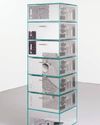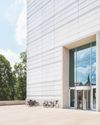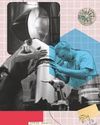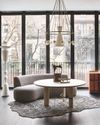
At the moment in Berlin, kapitän Gropius’s keel is shipwrecked in a sea of muddy ditches, its programming relocated to a temporary annex. The building, which broke ground in 1976, the same year the kapitän’s Dessau campus was restored by the German Democratic Republic, opened in 1979 and was never much loved, although footfalls dramatically increased after the Wall came down. It is visibly the result of compromise: Gropius’s original plans, drawn up in 1964 for a sloped site in the small city of Darmstadt near Frankfurt, were waylaid by local politicians; only in the following decade, after Gropius’s death, did the project find a site in then–West Berlin. The dislocation did violence to the original scheme, however, requiring extensive modifications by Gropius’s acolyte Alex Cvijanovic (not least among them translating the building to flatland).
This story is from the November/December 2019 edition of Metropolis Magazine.
Start your 7-day Magzter GOLD free trial to access thousands of curated premium stories, and 9,000+ magazines and newspapers.
Already a subscriber ? Sign In
This story is from the November/December 2019 edition of Metropolis Magazine.
Start your 7-day Magzter GOLD free trial to access thousands of curated premium stories, and 9,000+ magazines and newspapers.
Already a subscriber? Sign In

No New Buildings
The energy already embodied in the built environment is a precious unnatural resource. It’s time to start treating it like one.

The Circular Office
Major manufacturers are exploring every avenue to close the loop on workplace furniture.

Signs of Life
Designers, curators, and entrepreneurs are scrambling to make sense of motherhood in a culture that’s often hostile to it.

Interspecies Ethic
In probing the relationship between humans and nature, two major exhibitions question the very foundations of design practice.

Building on Brand
The Bauhaus turned 100 this year, and a crop of museum buildings sprang up for the celebration.

Building for Tomorrow, Today
Radical change in the building industry is desperately needed. And it cannot happen without the building trades.

Strength from Within
Maggie’s Centres, the service-focused cancer support network, eschews clinical design to arm patients in their fight for life.

Next-Level Living
The availability of attractive, hospitality-grade products on the market means everyday consumers can live the high life at home.

Mi Casa, Su Casa
Casa Perfect creates a memorable shopping experience in lavish private homes.

Enter The Culinarium
AvroKO imagines the future of residential amenities—where convenience, comfort, and sustainability meet.